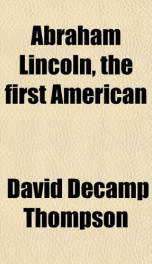abraham lincoln the first american

Purchase of this book includes free trial access to www.million-books.com where you can read more than a million books for free. This is an OCR edition with typos. Excerpt from book: A STOREKEEPER IN ILLINOIS. A FTER a few years Thomas Lincoln grew tired -ti. of Indiana, and Illinois having been portrayed to him as a veritable paradise, he pulled up stakes and migrated thither in February, 1830, settling near Decatur. Young Abraham accompanied his father. On the way they crossed a shallow stream that was covered with thin ice. After the family had reached the shore, Abraham heard the cries of their little dog, which was standing on the op- opposite bank, and was afraid to step into the icy water. "I can not bear to see even a puppy in distress," he said, so he rolled up his trousers, and barefoot waded the stream, took the dog in his arms, and carried it safely across. Abraham assisted his father in building his cabin, clearing ground, and planting a crop. It was during this time that Lincoln and John Hanks split the rails which were introduced with such tremendous effect at the Republican State Convention, held in Decatur, 111., in 1860, which nominated delegates to the ensuing National Convention. Lincoln had scarcely taken his seat in the Convention, when General Oglesby announced that an old Democrat of Macon County desired to make a contribution to the Convention. At once several farmers entered the hall carrying on their shoulders two old fence- rails, bearing the inscription : " Abraham Lincoln, the rail candidate for the Presidency in 1860. Two rails from a lot of three thousand, made in 1830 by Thomas Hanks and Abe Lincoln, whose father was the first pioneer of Macon County." The effect was thrilling. The cheering continued for fifteen minutes, and the demonstration showed the Convention and the country that Abraham Lincoln was the only choice of the Republicans of Illinois for the Presidency. When Lincoln became of age, he thought it time...
Info about the book
Author:
Series:
Unknown
ISBN:
0307382028
Rating:
3.5/5 (4)Your rating:
0/5
Languge:
English
Users who have this book
Users who want this book
What readers are saying
What do you think? Write your own comment on this book!
write a commentGenre
if you like abraham lincoln the first american try:
Other books by this author
Do you want to read a book that interests you? It’s EASY!
Create an account and send a request for reading to other users on the Webpage of the book!


